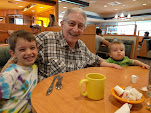...from Sally
Subject: GRANDPA'S HANDS
This is good; I'll never look at my hands the same!
Grandpa, some ninety plus years, sat feebly on the patio bench. He didn't move, just sat with his head down staring at his hands. When I sat down beside him he didn't acknowledge my presence and the longer I sat I wondered if he was OK. Finally, not really wanting to disturb him but wanting to check on him at the same time, I asked him if he was OK.
He raised his head and looked at me and smiled. Yes, I'm fine, thank you for asking, he said in a clear strong voice. I didn't mean to disturb you, grandpa, but you were just sitting here staring at your hands and I wanted to make sure you were OK, I explained to him.
Have you ever looked at your hands he asked. I mean really looked at your hands?
I slowly opened my hands and stared down at them. I turned them over, palms up and then palms down. No, I guess I had never really looked at my hands as I tried to figure out the point he was making. Grandpa smiled and related this story:
Stop and think for a moment about the hands you have, how they have served you well throughout your years. These hands, though wrinkled, shriveled and weak have been the tools I have used all my life to reach out and grab and embrace life.
They braced and caught my fall when as a toddler I crashed upon the floor. They put food in my mouth and clothes on my back. As a child my mother taught me to fold them in prayer. They tied my shoes and pulled on my boots. They held my rifle and wiped my tears when I went off to war.
They have been dirty, scraped and raw, swollen and bent. They were uneasy and clumsy when I tried to hold my newborn son. Decorated with my wedding band they showed the world that I was married and loved someone special. They wrote the letters home and trembled and shook when I buried my parents and spouse and walked my daughter down the aisle.
Yet, they were strong and sure when I dug my buddy out of a foxhole and lifted a plow off of my best friend's foot. They have held children, consoled neighbors, and shook in fists of anger when I didn't understand. They have covered my face, combed my hair, and washed and cleansed the rest of my body. They have been sticky and wet, bent and broken, dried and raw.
And to this day, when not much of anything else of me works real well, these hands hold me up, lay me down, and again continue to fold in prayer. These hands are the mark of where I've been and the ruggedness of my life. But more importantly it will be these hands that God will reach out and take when he leads me home.
And with my hands He will lift me to His side and there I will use these hands to touch the face of Christ.
I will never look at my hands the same again. But I remember God reached out and took my grandpa's hands and led him home.
When my hands are hurt or sore or when I stroke the face of my children and wife I think of grandpa. I know he has been stroked and caressed and held by the hands of God. I, too, want to touch the face of God and feel His hands upon my face.
When you receive this, say a prayer for the person who sent it to you and watch God's answer to prayer work in your life.
Let's continue praying for one another . Passing this on to anyone you consider a friend will bless you both. Passing this on to one not considered a friend is something Christ would do!!

